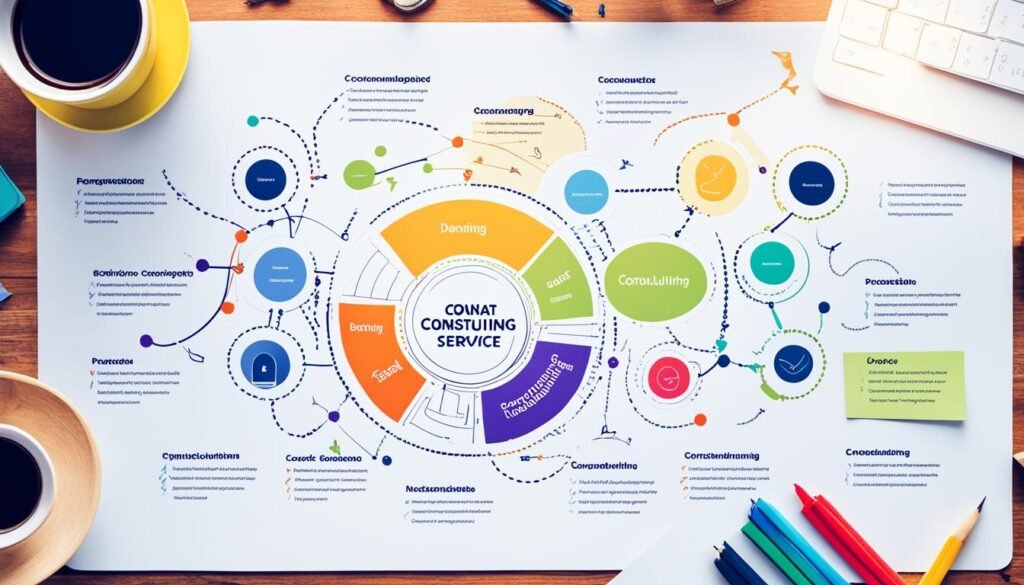Are you ready to take your skills and experience to the next level? Have you ever considered becoming a consultant and leveraging your expertise to unlock new opportunities? Consulting offers a rewarding career where you can transform your knowledge and abilities into valuable services that help others succeed. Whether you’re a seasoned professional or just starting your journey, this step-by-step guide will show you how to leverage your skills and experience into consulting opportunities.
In today’s competitive business landscape, companies and individuals are seeking specialized expertise to tackle complex challenges. By leveraging your skills and experience, you can position yourself as a trusted advisor and offer high-value consulting services to clients in Indonesia.
To begin your journey towards a successful consulting business, you need to define your niche. By identifying your strengths and ideal clients, you can differentiate yourself from competitors and attract the right opportunities. But that’s just the start.
Crafting a compelling value proposition, telling your brand story, designing an effective service model, building a strong online presence, and growing your network and reputation are key steps to success. Each step contributes to your ability to transform your expertise into consulting opportunities that align with your skills and goals.
Through this guide, you’ll learn how to effectively leverage your skills and experience, step by step, ensuring that you create a solid foundation for your consulting business in Indonesia. So, are you ready to transform your expertise into a successful consulting career? Let’s get started!
Define Your Niche
To successfully leverage your skills and experience into consulting opportunities, it’s crucial to define your niche. This involves identifying the specific problem that you can solve for a specific audience. By analyzing your strengths, passions, and skills, as well as the needs, pains, and goals of your ideal clients, you can narrow down your focus and differentiate yourself from competitors. It’s important to strike a balance between a niche that sets you apart and one that has sufficient demand and potential.
- Analyze your strengths: Take a deep look at what you excel at and enjoy doing. Consider your areas of expertise and skills that set you apart.
- Identify ideal clients: Determine who your target audience is. Understand their needs, pains, and goals. This will help you tailor your services to their specific requirements.
- Differentiate from competitors: Research your competitors in the consulting market. Identify the gaps and opportunities where you can offer something unique and valuable to your clients.
By defining your niche, you can position yourself as an expert in that specific area, attracting clients who are seeking your specialized knowledge and skills. This focused approach allows you to provide tailored solutions and establish yourself as a go-to consultant in Indonesia.
Craft Your Value Proposition
Once you have defined your niche, it is essential to craft a compelling value proposition that sets you apart from your competitors. Your value proposition is a concise statement that communicates the unique benefits, credibility, and relevance you offer to your clients in your specific niche.
To craft an effective value proposition, you need to focus on clearly articulating your core offer, target market, key benefits, and proof points. Start by identifying the core problem or need that your clients have and explain how your expertise and experience can solve it.
Highlight the specific benefits that your clients will gain from working with you. Emphasize how your services can help them achieve their desired outcomes, overcome challenges, or reach their goals. By communicating the value you bring to the table, you demonstrate your understanding of your clients’ needs and establish trust and credibility.
It is also crucial to emphasize your unique selling points and what sets you apart from your competitors. Showcase your expertise, relevant qualifications, and past successes to establish your credibility and position yourself as the go-to consultant in your niche.
Remember to keep your value proposition clear and concise. Use language that resonates with your target audience and avoids jargon or technical terms. Aim to communicate the benefits of your services in a way that is easily understood and relatable.
By crafting a compelling value proposition, you can effectively communicate the benefits, credibility, and relevance you offer to your niche. This will set you apart from competitors and attract more consulting opportunities.

Tell Your Brand Story
Your brand story is more than just a narrative. It’s a powerful tool that connects your personal journey, values, and mission with your niche and value proposition. With a compelling brand story, you can inspire, educate, and persuade your audience to trust you and choose to work with you.
When telling your brand story, it’s essential to define your purpose, vision, personality, and message. These elements allow you to convey your authenticity and uniqueness as a consultant in Indonesia. By weaving together your personal and professional journey, you create a connection with your audience, making them feel like they truly know and understand you.
Your brand story helps differentiate you from other consultants and establishes your credibility. It showcases the values that drive your work and the mission that guides your consulting practice. When your audience resonates with your brand story, they are more likely to trust you and see you as the right consultant to solve their problems.
Remember, your brand story should not only be captivating but also aligned with your niche and value proposition. It should clearly communicate how your personal journey and experiences have shaped your expertise and make you the ideal consultant to work with. Craft your brand story carefully, and leverage it as a powerful instrument to attract clients and build lasting relationships.
Design Your Service Model
When it comes to delivering your value proposition to clients, designing a well-thought-out service model is crucial. Your service model should be in line with your goals, skills, and resources, while also meeting your clients’ expectations, preferences, and budget. By carefully designing your service model, you can ensure that you provide high-quality consulting services that not only meet your clients’ needs but also attract more opportunities.
Pricing Strategy
One important aspect of designing your service model is deciding on your pricing strategy. You’ll need to determine the most appropriate pricing structure for your consulting services. Consider factors such as your expertise, market demand, competition, and perceived value. Whether you choose to charge an hourly rate, a fixed price, or a retainer fee, make sure your pricing strategy aligns with your target clients’ expectations, while also reflecting the value you provide.
Delivery Format
Another essential component of your service model is the delivery format of your consulting services. Will you provide in-person consultations, virtual sessions, or a combination of both? Assess your clients’ preferences and your ability to deliver your expertise effectively through various formats. Make sure your chosen delivery format is convenient and accessible for both you and your clients.
Scope of Work
Defining the scope of work is vital to ensure clarity and avoid any ambiguities in your consulting services. Clearly outline what your services cover and what they don’t to manage your clients’ expectations effectively. By setting clear boundaries and communicating the specific deliverables, you can establish a solid foundation for successful consulting engagements.
Terms and Conditions
Establishing clear terms and conditions is equally important for seamless collaboration with your clients. Define your payment terms, cancellation policy, confidentiality agreements, and any other legal considerations. Having well-documented terms and conditions protects both you and your clients, ensuring a professional and mutually beneficial relationship.
To illustrate the importance of designing your service model effectively, let’s consider an example:

You are a marketing consultant offering digital marketing services. Your pricing strategy involves a combination of fixed pricing for standard services and customizable packages for clients requiring specialized solutions. You deliver your services both through in-person consultations for local clients and virtual meetings for clients located elsewhere. Your scope of work includes developing marketing strategies, implementing campaigns, and providing analytics reports. To protect both you and your clients, you have established clear terms and conditions regarding payments, cancellations, and data confidentiality.
By designing your service model thoughtfully, you ensure that your clients receive the highest quality consulting services tailored to their needs, while also positioning yourself as a trustworthy and reliable consultant.
Build Your Online Presence
Building your online presence is crucial for attracting, engaging, and converting prospects into leads and clients. In today’s digital age, having a strong online presence is essential for establishing credibility and growing your consulting business.
Creating a Professional Website
A professional website is the foundation of your online presence. It serves as a digital storefront where potential clients can learn more about your consulting services, explore your expertise, and contact you for inquiries. Your website should have a clean and modern design, easy navigation, and relevant content that showcases your value proposition and differentiates you from competitors.
Developing a Relevant Social Media Profile
In addition to a professional website, you should also establish a presence on relevant social media platforms. Identify the platforms where your target audience spends most of their time and create engaging profiles that reflect your brand. Share valuable content, engage with your audience, and leverage social media advertising to expand your reach and attract potential clients.
Implementing a Valuable Content Strategy
A valuable content strategy is essential for building trust with your audience and positioning yourself as an expert in your niche. Create high-quality content that addresses the pain points and challenges of your target audience, and provide actionable insights and solutions. This can include blog posts, articles, videos, infographics, and more. Consistently sharing valuable content will not only attract traffic to your website but also establish you as a go-to resource for consulting expertise.
In conclusion, building your online presence through a professional website, a relevant social media profile, and a valuable content strategy is vital for attracting potential clients and growing your consulting business. By showcasing your expertise, differentiating yourself from competitors, and engaging with your target audience, you can establish yourself as a trusted consultant in the Indonesian market.
Conclusion
Unlock the potential of your skills and experience by seizing the consulting opportunities that await you. Transforming your expertise into a successful consulting business in Indonesia begins with defining your niche. Analyze your strengths and identify the specific problem you can solve for your ideal clients.
Craft a compelling value proposition that communicates the unique benefits, credibility, and relevance you bring to your niche. Your value proposition will differentiate you from competitors and attract more consulting opportunities.
Tell your brand story and connect your personal journey, values, and mission with your niche and value proposition. Build trust with your audience and make them eager to work with you.
Design your service model to align with your goals and meet your clients’ expectations. Set your pricing strategy, determine the scope of work, and establish clear terms and conditions.
Build a strong online presence by creating a professional website, developing relevant social media profiles, and implementing a valuable content strategy. Establish yourself as an expert in your niche and increase your visibility in the consulting market.
As you leverage your skills and experience, remember to grow your network and reputation. Connect with like-minded professionals, collaborate, and continuously learn from others. Embrace new opportunities and stay adaptable to remain at the forefront of the consulting industry in Indonesia.
Opportunities abound for talented consultants like you. Start leveraging your skills today and transform your expertise into a thriving consulting business. Make a lasting impact and unlock a world of possibilities.
Source Links
- https://www.linkedin.com/advice/0/how-do-you-leverage-other-niche-consultants-success
- https://www.linkedin.com/advice/3/how-can-you-leverage-your-experiences-create
- https://www.westmonroe.com/careers/resources/in-brief/moving-from-industry-to-consulting-what-to-expect


